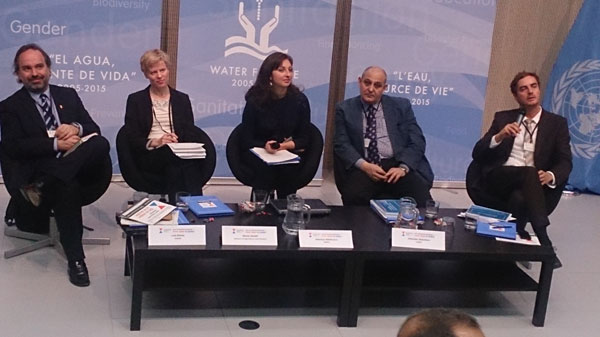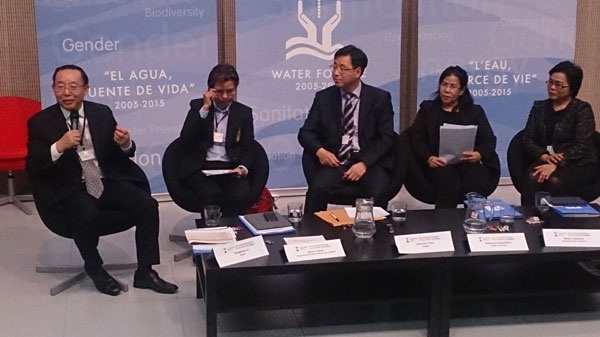

Environmental experts in Asia want strong cooperation networks set up to help the continent achieve Sustainable Development Goals that are to be launched at the end of this year.
Dr Iskander Adbullaev, Executive Director for the Regional Environmental centre for Central Asia says lack of strong cooperation networks is partly to blame for hindering some Asian countries from achieving the Millennium Development Goal related to water and sanitation.
Goal 7, target 10 of the Millennium Development Goals called for halving by 2015 the proportion of people without sustainable access to safe drinking water and basic sanitation. Most countries in Asia attained their target to halve the number of people who do not have access to safe drinking water but failed out on access to basic sanitation.
Dr Iskander says other factors that hindered Asia from achieving the Millennium Development Goal related to water and sanitation include: persistent poor quality of water and unequal distribution of water.
He now wants this scenario not repeated during the implementation of Sustainable Development Goals, on the continent where rapid and uncontrolled urbanisation is leading to more water problems especially in urban areas.
There are 17 proposed SDGs and 169 targets. SDG six focuses on water and sanitation. It has eight targets. Others five SDGs have seven targets directly or indirectly linked to water-related issues. A high level summit to adopt the SDGs takes place in New York, USA in September this year.
Dr Iskander was speaking during the special regional session about implementing the water related SDGs in the UNECE region at the 2015 UN-Water Annual International Zaragoza conference.

Dr Iskander Adbullaev (second from right in a blue coat)
He also told the international community to "not only concentrate on criticizing Asia but also celebrate what it has achieved in the development process."
Dr Iskander did not in particular name those criticizing development efforts in Asia but said they were development partners which condemn institutions in Asia instead of working with them to develop the continent.
Speaking during the same occasion, Hongpeng Liu, Chief Energy Security and Water Resources Section at UN Economic and Social Commission for Asia and the Pacific said enhancing regional cooperation would strengthen the "resilience of member countries to address challenges that are hindering them from providing safe water and sanitation for all."

Hongpeng Liu (first from left holding a microphone)
Up to 178 million people have no access to sanitation services in South-East Asia. The lack of safe water and sanitation in most developing countries is the basis for most problems in these countries. In a country such as Vietnam, up to 20,000 people die each year due to lack of clear water and proper sanitation and hygiene according to Liu.
Liu also lamented the weak capacity of some governments in Asia to finance water and sanitation projects in their countries.
He however told the governments there to "to come up with creative methods to raise funds for financing such water and sanitation programmes and capacity development," to enable them achieve Sustainable Development Goals.
South Korea is one of the countries in Asia that have had notable progress in provision of water and sanitation services. The country was able to progress from 17 percept water supply coverage in 1961 to 98 percept in 2012.
Dr. Jong Ho Ahn, Senior Researcher Fellow and Director for Environmental Policy Research Group Division of Water Environment at Korea Environment Institute attributes this remarkable progress to the commitment of South Korea's government to finance programmes meant to help its people live better lives.
He says governments must compel themselves to help their people live better lives and one of such commitments is provision of safe water and basic sanitation.
 PLA soldiers operating vehicle-mounted guns in drill
PLA soldiers operating vehicle-mounted guns in drill Beauties dancing on the rings
Beauties dancing on the rings Blind carpenter in E China's Jiangxi
Blind carpenter in E China's Jiangxi Top 10 highest-paid sports teams in the world
Top 10 highest-paid sports teams in the world In photos: China's WZ-10 armed helicopters
In photos: China's WZ-10 armed helicopters UFO spotted in several places in China
UFO spotted in several places in China Certificates of land title of Qing Dynasty and Republic of China
Certificates of land title of Qing Dynasty and Republic of China  Cute young Taoist priest in Beijing
Cute young Taoist priest in Beijing New film brings Doraemon's life story to China in 3D
New film brings Doraemon's life story to China in 3D China-S.Korea FTA sets positive precedent
China-S.Korea FTA sets positive precedent Ferry carrying 458 people sinks in Yangtze River
Ferry carrying 458 people sinks in Yangtze River Mecca of Marxism
Mecca of Marxism Bring them home
Bring them homeDay|Week